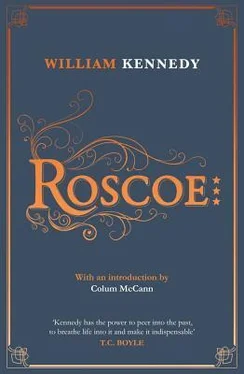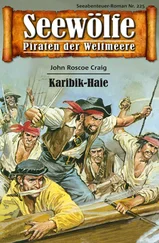The 1945 election was twelve weeks away, the Governor’s three-year-old investigation was intensifying if you believed Cutie, and who knew what they might come up with? The Republicans, because of the Governor’s pressure, were running Jason (Jay) Farley for mayor, an intelligent Irish Catholic businessman who made smart speeches, their strongest candidate in years. And the absence of Alex, the city’s soldier-boy Mayor, who was still somewhere in Europe, was a factor to be determined. Patsy had decided that, not only would we win this election, we would also humiliate the Governor for trying to destroy us, and his secret weapon was an old one: a third-party candidate who would dilute the Republican vote, the same ploy Felix Conway had used repeatedly in the 1880s and ’90s.
Roscoe, working on his second gin and quinine, sat facing Patsy, who was having his usual: Old Overholt neat. Patsy sat here often, but he was out of place amid the gilded rococo furniture and Oriental rugs of the lobby, and looked as if he’d be more at ease at a clambake. But despite the August heat, there he was under his trademark fedora, sitting where Felix Conway had received visitors a quarter-century ago, looking not at all like a man of power, yet with far greater power than Felix could have imagined having. For Patsy now, as leader of the Albany Democratic Party for twenty-four heady years, was everybody’s father, Roscoe included. Patsy, five years Roscoe’s senior, was the main man, the man who forked the lightning, the boss.
“What’s so urgent?” Patsy asked Roscoe.
“It’s not urgent to anybody but me, but it is important. I have to retire.”
Patsy screwed up his face.
“Say it again?”
“I’ve got to get out. Do something else. Go someplace else. I can’t do this anymore.”
“Do what?”
“What I do.”
“You do everything.”
“That’s part of it.”
“You gettin’ bored?”
“No.”
“You need money?”
“I’ve got more money than I can use.”
“You have another bad love affair?”
“When did I ever have a good one?”
“Then what is it?”
“You know what it’s like when you come to the end of something, Pat?”
“Not yet I don’t.”
“Of course. You’ll go on forever. But it’s over for me and I don’t know why. It may seem sudden to you, but it’s been on the way a long time. There’s nothing I can do about it. It’s just over.”
“The organization can’t get along without you. You’re half of everything I do. More than half.”
“Nonsense. You can get twenty guys this afternoon.”
“Counting all my life,” Patsy said, “I never knew three, let alone twenty, I trusted the way I trust you.”
“That’s why I’m giving you plenty of notice. I’ll ride out the election, but then I have to quit.”
“It’s this goddamned investigation. Did they come up with something on you?”
“Cutie LaRue says they’re hot to get me, but we all know that, and that’s not it. I’m fifty-five years old and going noplace. But now I’ve got to go someplace. Anyplace. I need more room in my head.”
“You’re leaving Albany?”
“Maybe. If I can convince my head to leave town.”
“You’re sick from that ulcer. That’s it.”
“My gut hurts, but I’ve never felt better. Don’t look for a reason. There’s twenty, fifty. If I could figure it out I’d tell you.”
“We gotta talk about this.”
“We are talking about it.”
“What about the third-party candidate? You got one?”
“I’m working on it.”
“Did you tell Elisha about this plan of yours?”
“He’s due here for dinner. I’ll tell him then.”
“This is a disaster.”
“No, it isn’t.”
“Goddamn it, if I say it’s a disaster it’s a disaster. This is a goddamn disaster. What the hell’s got into you?”
“Time. Time gets into everything. I’m sick of carrying time around on my back like a bundle of rocks.”
“Time? What are you talking about, time? To hell with time.”
“Pat, don’t worry. We’ll figure it out.”
“Time. Jesus H. Jesus.”
The lives of Roscoe, Patsy McCall, and Elisha Fitzgibbon had been a lock from their shared boyhood on the city streets they would come to own, at the cockpits where their fathers fought chickens, and on the nine hundred acres of Tivoli, the great Fitzgibbon estate in Loudonville created by Elisha’s grandfather Lyman Fitzgibbon, who in his long life made several fortunes — in railroads, land speculation, foundries, and steel manufacture. Tivoli was a paradise made for moneyed creatures and small boys. The three walked the virgin woods of oak and maple and birch and hemlock and white pine, they fished the pristine waters of Elisha’s tiny Lake Tivoli until they outgrew sunfish and perch and went down to the Hudson River for blues, stripers, shad, and sturgeon. They swam in the Erie Canal and the river, hunted partridge and pheasant on the river flats, wild turkey in the Fitzgibbon woods, and deer up at Tristano, Elisha’s family’s sumptuous rustic camp in the Adirondacks. The boys brought their river catch and hunters’ quarry to Felix Conway’s table, for neither Patsy’s mother nor Elisha’s stepmother would give them houseroom. Roscoe organized all their excursions, fished with the eye of a pelican, and could put a bullet between a snake’s fangs at sixty yards. Felix marveled at his son’s talent, but it was his own doing, for he’d given Roscoe a.22 rifle as soon as the boy reached the age of good reason.
“Remember,” his mother warned Roscoe at age nine, just after Felix had left her and the children to live at the Ten Eyck, “never shoot anybody with that gun unless it’s a politician.”
But it was the politics of Democracy that cemented the boys’ friendship. Their headquarters, even before they’d begun to drink, was the North End saloon run by Patsy’s father, Black Jack McCall, the Ninth Ward leader who would become sheriff. The saloon had long been closed, but Patsy reopened it every year to hear the ward leaders predict the vote they would deliver, and then give them their street money to help it happen. The trio’s mentor in the liabilities of political honesty was Felix, who helped them plan Patsy’s campaign for a city assessorship in 1919, the year he died. Campaign money came from Elisha, who, along with his siblings, inherited the steel fortune accumulated by his grandfather Lyman (who had helped finance Grover Cleveland’s first campaign for the presidency). Elisha financed both Patsy’s successful run for the assessorship in 1919, and the Democratic takeover of City Hall in the 1921 election. After that, politics was the mother lode for this trio, and money, for most of the decade, was not a problem.
Roscoe and Elisha were in the Ten Eyck dining room, finishing their second bottle of wine with a dinner of shrimp, bluefish, boiled potatoes, and fresh snowflake rolls. Elisha exuded ruddy good health, or was it the flush that comes with a summer evening? He was the picture of composure in his buttoned-down Brooks Brothers shirt, his tie tight on his collar, his double-breasted cream sport jacket impeccably tailored by Joe Amore, his steel-gray hair associated with Men of Distinction in whiskey ads. His age was visible in his receding hairline, but Red the Barber had consoled him that he would not live long enough to be bald. No one looked more stylishly rich than Elisha, the capitalist at his zenith.
The bells of St. Peter’s Church began ringing up the street and Roscoe said, “So it’s over.”
“Sounds that way.”
“Alex will be coming home.”
“I hope he’s not one of those postwar casualties like that German soldier in All Quiet on the Western Front. It’s after the Armistice, and he raises his head up out of the trench to look at a butterfly, and a sniper who doesn’t know the war is over, or maybe he does, puts one through his brain.”
Читать дальше












